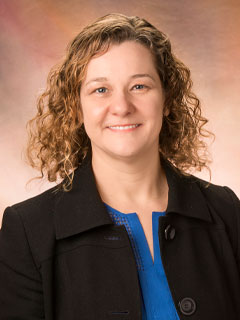HOW CAN WE HELP YOU? Call 1-800-TRY-CHOP
In This Section

Dr. Lambert's research focuses on understanding the mechanisms of inherited and acquired thrombocytopenia in pediatric patients. Using clinical translational methods to link discovery in rare platelet disorders with optimizing next-generation sequencing for clinical practice, she has been involved in the Undiagnosed Disease Network Program and the Frontier Program in Immune Dysregulation, incorporating genetics of platelet disorders and immunohematology.
Bio
Dr. Lambert's earliest research showed that platelet PF4 levels inversely correlated with platelet counts in mice and that the degree and duration of thrombocytopenia seen in mice after chemotherapy or radiation were inversely related to platelet PF4 levels. A retrospective analysis of pediatric patients with acute lymphoblastic leukemia supported these studies and suggested that the observations in mice are important in human platelet counts as well.
Recently, Dr. Lambert collaborated on a study that demonstrated that blocking PF4 using a desulfated heparin, ODSH, can mitigate thrombocytopenia in both murine and canine models of radiation-induced thrombocytopenia and markedly improve survival. Further studies showed that other bone marrow injury states, such as immune thrombocytopenia (ITP), are influenced by PF4 levels in bone marrow.
Her current research focuses on understanding the role of genetics in regulating platelet number and function in inherited and acquired platelet disorders. By using next-generation sequencing, she aims to unravel those genetic factors that determine phenotypes. Understanding these influences will lead to understanding the risk factors for severity, targeting therapy, and improving overall outcomes.
In addition, Dr. Lambert is studying the roles of platelet-specific proteins in determining phenotypes in platelet disorders. Not all patients with ITP bleed, not all patients with severe inherited platelet disorders have severe phenotypes. By better understanding these roles, Dr. Lambert and her colleagues hope to be better able to tailor and target therapies.
Her research accomplishments have been recognized by her positions as:
- Chair (Elect) of the Pediatric ITP Consortium of North America
- Member of the ClinGen Platelet Disorder Expert Panel
- Co-chair of the ISTH Scientific Subcommittee on Genomics in Thrombosis and Hemostasis
- Medical director of the Special Coagulation Laboratory at Children’s Hospital of Philadelphia
Education and Training
BS, Rensselaer Polytechnic Institute (Biology), 1995
MD, UMDNJ - New Jersey Medical School, 1999
MTR, University of Pennsylvania (Translational Research), 2010
Titles and Academic Titles
Associate Clinical Director, Frontier Program in Immune Dysregulation
Director, Clinical Coagulation Laboratory
Medical Director, Special Coagulation Laboratory
Associate Professor of Pediatrics
Professional Memberships
American Medical Association, 1999-
International Society of Thrombosis and Haemostasis, 2007-
American Society of Pediatric Hematology/Oncology, 2007-
American Society of Hematology, 2007-
22q and You Foundation, 2008-
Platelet Disorder Support Association, 2008-
Cornelia De Lange Foundation, 2008-
Society for Pediatric Research/Pediatric Academic Society, 2011-
Hemostasis and Thrombosis Research Society, 2013-
Pediatric ITP Consortium of North America, 2013-
Radiation Research Society, 2015-
ClinGen Platelet Disorder Expert Panel, 2018-
Professional Awards
American Society of Hematology Young Investigator Travel Award, 2005
American Society of Pediatric Hematology/Oncology Young Investigator Travel Award, 2006
International Society on Thrombosis and Haemostasis New Investigator Travel Award, 2009, 2011
Early Career Investigator Travel Award, Radiation Research Society, 2016